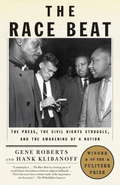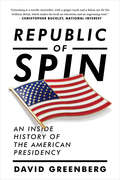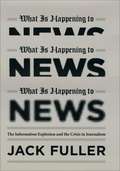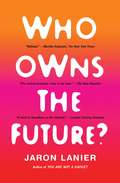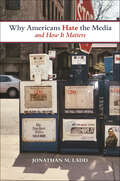Special Collections
Goldsmith Book Prize
Description: The Goldsmith Book Prize is awarded to the trade and academic book published in the last 24 months that best fulfills the objective of improving democratic governance by examining of the intersection between the media, politics and public policy. #award
- Table View
- List View
Political Journalism in Comparative Perspective
by Erik Albæk Arjen van Dalen Nael Jebril Claes H. de Vreese and Erik Albæk and Arjen Van Dalen and Nael Jebril and Claes H. de VreesePolitical journalism is often under fire. Conventional wisdom and much scholarly research suggest that journalists are cynics and political pundits. Political news is void of substance and overly focused on strategy and persons. Citizens do not learn from the news, are politically cynical, and are dissatisfied with the media. This book challenges these assumptions, which are often based on single-country studies with limited empirical observations about the relation between news production, content, and journalism's effects. Based on interviews with journalists, a systematic content analysis of political news, and panel survey data in different countries, this book tests how different systems and media-politics relations condition the contents of political news. It shows how different content creates different effects, and demonstrates that under the right circumstances citizens learn from political news, do not become cynical, and are satisfied with political journalism.
The Race Beat
by Gene Roberts and Hank KlibanoffAn unprecedented examination of how news stories, editorials and photographs in the American press—and the journalists responsible for them—profoundly changed the nation’s thinking about civil rights in the South during the 1950s and ‘60s.
Roberts and Klibanoff draw on private correspondence, notes from secret meetings, unpublished articles, and interviews to show how a dedicated cadre of newsmen—black and white—revealed to a nation its most shameful shortcomings that compelled its citizens to act. Meticulously researched and vividly rendered, The Race Beat is an extraordinary account of one of the most calamitous periods in our nation’s history, as told by those who covered it.
Pulitzer Prize Winner
Republic of Spin
by David Greenberg
In Republic of Spin—a vibrant history covering more than one hundred years of politics—presidential historian David Greenberg recounts the rise of the White House spin machine, from Teddy Roosevelt to Barack Obama. His sweeping, startling narrative takes us behind the scenes to see how the tools and techniques of image making and message craft work. We meet Woodrow Wilson convening the first White House press conference, Franklin Roosevelt huddling with his private pollsters, Ronald Reagan’s aides crafting his nightly news sound bites, and George W. Bush staging his “Mission Accomplished” photo-op. We meet, too, the backstage visionaries who pioneered new ways of gauging public opinion and mastering the media—figures like George Cortelyou, TR’s brilliantly efficient press manager; 1920s ad whiz Bruce Barton; Robert Montgomery, Dwight Eisenhower’s canny TV coach; and of course the key spinmeisters of our own times, from Roger Ailes to David Axelrod.
Greenberg also examines the profound debates Americans have waged over the effect of spin on our politics. Does spin help our leaders manipulate the citizenry? Or does it allow them to engage us more fully in the democratic project? Exploring the ideas of the century’s most incisive political critics, from Walter Lippmann and H. L. Mencken to Hannah Arendt and Stephen Colbert, Republic of Spin illuminates both the power of spin and its limitations—its capacity not only to mislead but also to lead.
Tides of Consent
by James A. StimsonPolitics is a trial in which those in government - and those who aspire to be - make proposals, debate alternatives, and pass laws. Then the jury of public opinion decides. It likes the proposals or actions or it does not. It trusts the actors or it doesn't. It moves, always at the margin, and then those who benefit from the movement are declared winners. This book is about that public opinion response. Its most basic premise is that although pubic opinion rarely matters in a democracy, public opinion change is the exception. Public opinion rarely matters, because the public rarely cares enough to act on its concerns or preferences. Change happens only when the threshold of normal public inattention is crossed. When public opinion changes, governments rise or fall, elections are won or lost, old realities give way to new demands.
What Is Happening to News
by Jack FullerAcross America, newspapers that have defined their cities for over a century are rapidly failing, their circulations plummeting even as opinion-soaked Web outlets like the Huffington Post thrive. Meanwhile, nightly news programs shock viewers with stories of horrific crime and celebrity scandal, while the smug sarcasm and shouting of pundits like Glenn Beck and Keith Olbermann dominate cable television.
Is it any wonder that young people are turning away from the news entirely, trusting comedians like Jon Stewart as their primary source of information on current events? In the face of all the problems plaguing serious news, What Is Happening to News explores the crucial question of how journalism lost its way--and who is responsible for the ragged retreat from its great traditions.
Veteran editor and newspaperman Jack Fuller locates the surprising sources of change where no one has thought to look before: in the collision between a revolutionary new information age and a human brain that is still wired for the threats faced by our prehistoric ancestors.
Drawing on the dramatic recent discoveries of neuroscience, Fuller explains why the information overload of contemporary life makes us dramatically more receptive to sensational news, while rendering the staid, objective voice of standard journalism ineffective.
Throw in a growing distrust of experts and authority, ably capitalized on by blogs and other interactive media, and the result is a toxic mix that threatens to prove fatal to journalism as we know it.
For every reader troubled by what has become of news--and worried about what the future may hold--What Is Happening to News not only offers unprecedented insight into the causes of change but also clear guidance, strongly rooted in the precepts of ethical journalism, on how journalists can adapt to this new environment while still providing the information necessary to a functioning democracy.
Who Owns the Future?
by Jaron LanierJaron Lanier is the father of virtual reality and one of the world's most brilliant thinkers. Who Owns the Future? is his visionary reckoning with the most urgent economic and social trend of our age: the poisonous concentration of money and power in our digital networks. Lanier has predicted how technology will transform our humanity for decades, and his insight has never been more urgently needed. He shows how Siren Servers, which exploit big data and the free sharing of information, led our economy into recession, imperiled personal privacy, and hollowed out the middle class. The networks that define our world--including social media, financial institutions, and intelligence agencies--now threaten to destroy it. But there is an alternative. In this provocative, poetic, and deeply humane book, Lanier charts a path toward a brighter future: an information economy that rewards ordinary people for what they do and share on the web. grow. It is time for ordinary people to be rewarded for what they do and share on the web. Insightful, original, and provocative, Who Owns the Future? is necessary reading for everyone who lives a part of their lives online.
Why Americans Hate the Media and How It Matters
by Jonathan M. LaddAs recently as the early 1970s, the news media was one of the most respected institutions in the United States. Yet by the 1990s, this trust had all but evaporated. Why has confidence in the press declined so dramatically over the past 40 years? And has this change shaped the public's political behavior? This book examines waning public trust in the institutional news media within the context of the American political system and looks at how this lack of confidence has altered the ways people acquire political information and form electoral preferences. Jonathan Ladd argues that in the 1950s, '60s, and early '70s, competition in American party politics and the media industry reached historic lows. When competition later intensified in both of these realms, the public's distrust of the institutional media grew, leading the public to resist the mainstream press's information about policy outcomes and turn toward alternative partisan media outlets. As a result, public beliefs and voting behavior are now increasingly shaped by partisan predispositions. Ladd contends that it is not realistic or desirable to suppress party and media competition to the levels of the mid-twentieth century; rather, in the contemporary media environment, new ways to augment the public's knowledgeability and responsiveness must be explored. Drawing on historical evidence, experiments, and public opinion surveys, this book shows that in a world of endless news sources, citizens' trust in institutional media is more important than ever before.

